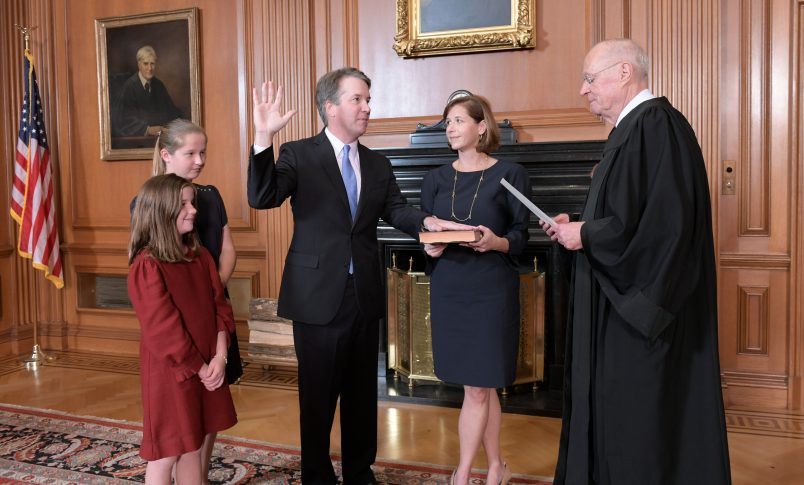In the wake of Brett Kavanaugh’s nomination and confirmation as a Supreme Court justice, several liberals have argued that if the Democrats win a majority again in the White House and Congress, they should consider packing the court and even limiting the tenure of court justices. I agree with these proposals by Paul Starr in The American Prospect and Barry Friedman in The New York Times. But the court’s role as a reactionary institution – one that desparately needs reform – began before Kavanaugh’s nomination.
The court became a reactionary institution – one that has subverted rather than protected American democracy – when it began in 1976 its series of campaign finance rulings. These rulings – from Buckley v. Valeo in in 1976 through Citizens United v. FEC in 2010 – have removed any restraint first on candidate spending in campaigns and then on individual and corporate donations to candidates and parties. The result has been that the underlying premise of political democracy – that political equality would trump (sorry to use that word) economic inequality — no longer prevails. Instead, economic inequality subverts political equality by giving the wealthy and economically powerful a greater say in our elections.
One can always cites elections where the losing candidate spent less money – the 2016 presidential election leaps to mind. But I’d bet that any comprehensive study of the last decades would show money has tilted elections toward Republicans. I’d cite, for one thing, what has happened in Arizona.
In 1998, Arizona voters tried to get around Buckley v. Valeo by passing a Clean Elections Act that gave candidates limited public funding, but in the case that rivals (and their supporters) tried to exceed these limits by private funding, matched their contributions. It levelled the playing field without restricting how much candidates could actually spend. In the 2002 election – an election year that generally favored Republicans – Democrat Janet Napolitano narrowly won the governorship over Republican Matt Salmon. Napolitano was easily re-elected in 2006. One reason she initially won was because Salmon was unable to outspend her. Don’t take my word for it. Here’s what the Weekly Standard wrote after the election:
On November 6, when most Americans were awakening to Republican electoral triumphs, Arizonans learned that they had bucked the trend by electing a left-wing Democrat as governor. What produced Janet Napolitano’s victory over GOP candidate Matt Salmon in a state with a 3-2 Republican registration advantage was not issues or personalities, but the nation’s most ambitious scheme for the public funding of election campaigns–a harbinger of liberal plans for remaking the nation’s political landscape.
But in 2011, the Supreme Court on a five-to-four vote (with Justice Kennedy, whom Kavanaugh is replacing, in the majority) struck down the key parts of the Arizona law on the spurious grounds – dating from Buckley v. Valeo — that it restricted free speech. Since then, Republicans have controlled all of Arizona’s major state offices, including the governorship. This year, in anticipation of a “blue wave,” David Garcia, the Democratic candidate for governor, was tied with Republican Doug Ducey, but since September, a massive amount of Republican spending – fifty to one on television ads – has doomed Garcia. Ducey now leads him by 15 points in the polls. If Arizona’s Clean Elections Act were still prevailing, it is very likely this race would still be tied.
There are two conclusions I’d draw from this. First, the problems with the court didn’t start with Kavanaugh this week or even Clarence Thomas and Samuel Alito. They started in 1976. Secondly, if liberals have any dreams of moving American beyond the New Deal toward a genuine social democracy, they need to find a way to overturn the spate of campaign finance rulings from the court and reinstitute a genuinely democratic reading of the first amendment in their place. If it takes packing (or threatening to pack the court, as Franklin Roosevelt did), that’s fine. It’s within the bounds of the Constitution.






